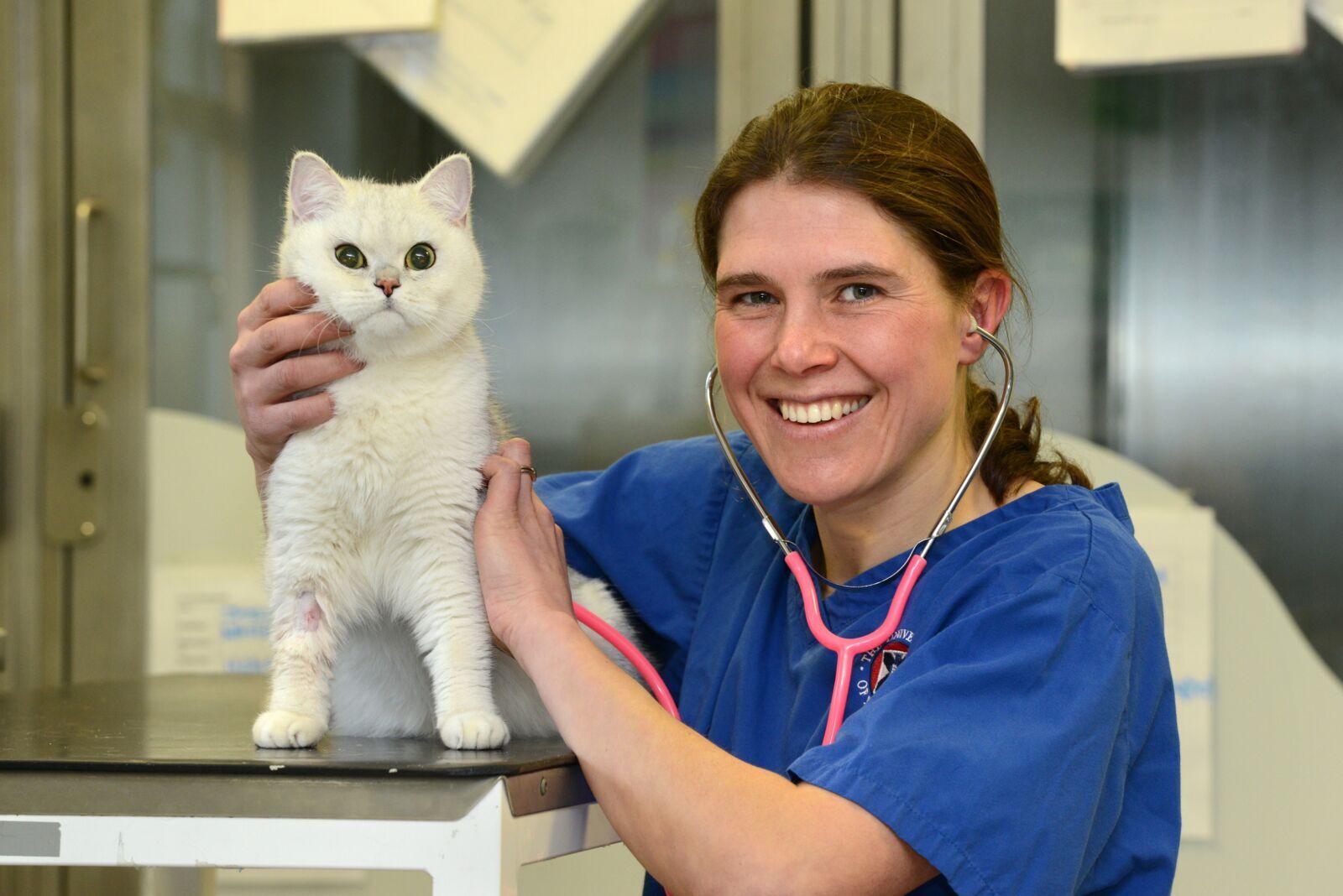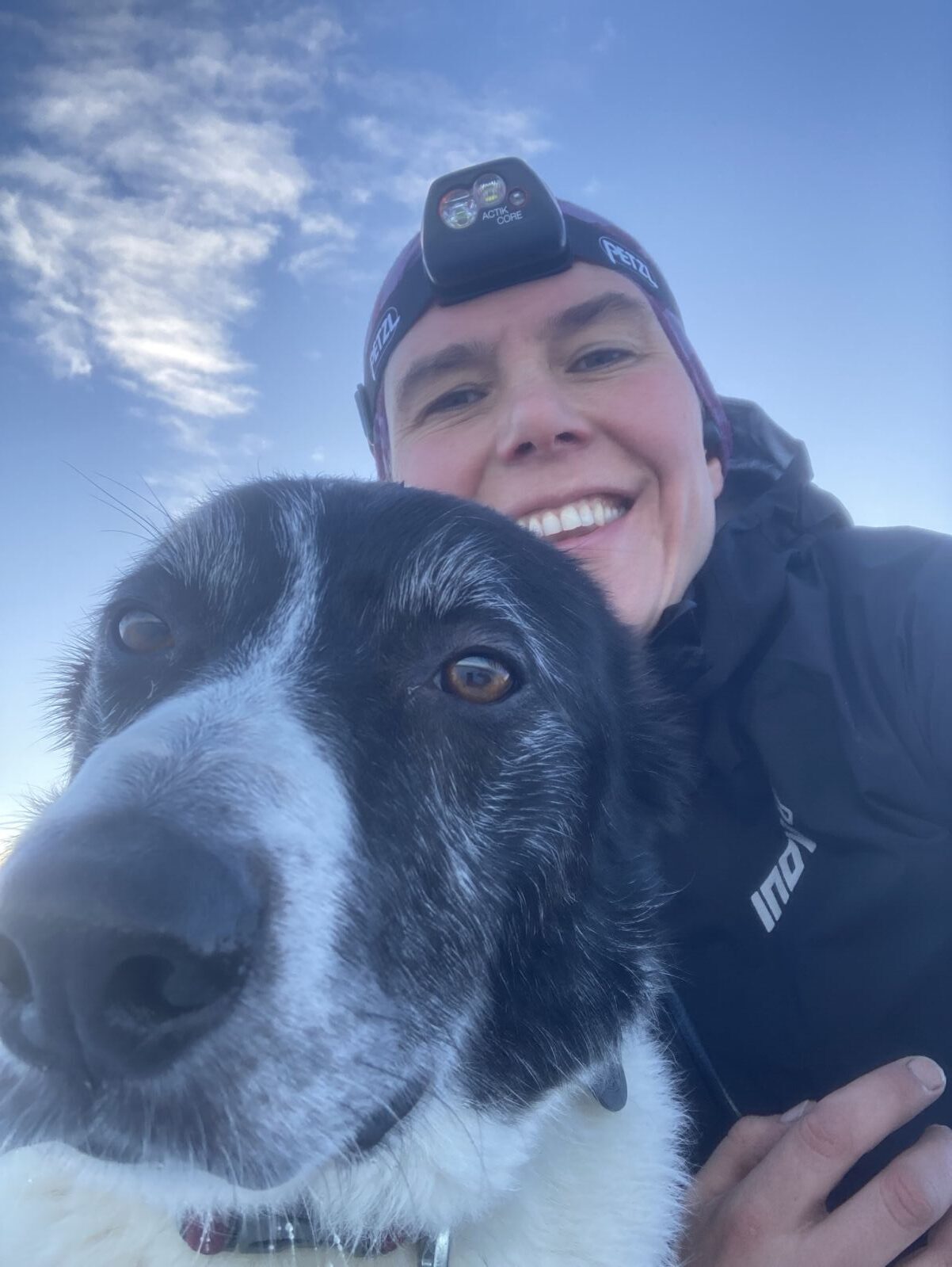Meet Vet Sustain Ambassador: Jasmin Paris
We’re delighted Jasmin has joined us as a Vet Sustain Ambassador and is as passionate as us about advancing sustainability across the veterinary professions and driving real impact. We had the pleasure to chat with Jasmin recently about many of the ‘hats’ she wears and how her worlds collide!
Vet Sustain
Jasmin is a Senior Lecturer at the University of Edinburgh and European Specialist in Small Animal Internal Medicine, alongside her vet career she is a mum of two, a co-founder of the Green Runners group, and a record-breaking ultra marathon runner! Jasmin made history in 2019 by setting a course record at the time for the Montane Spine Race, a 268-mile race along the Pennine way. She also set an iconic record in 2024 as the first woman to complete all five loops of the Barkley Marathons, a race of five-20 mile loops in Tennessee with a 60-hour time limit, a course only 20 people have ever completed.
We’re delighted Jasmin has joined us as a Vet Sustain Ambassador and is as passionate as us about advancing sustainability across the veterinary professions and driving real impact. We had the pleasure to chat with Jasmin recently about many of the ‘hats’ she wears and how her worlds collide!

What does your current role at the University of Edinburgh involve?
I do a mixture of clinical work, teaching and research. My research takes about 55% of my time, with time spent on clinics and teaching students the remaining 45%. My general research interest is in liver disease, and I’m currently working with a group that studies human liver disease. I’m interested in chronic fibrosing biliary diseases, in particular Primary Sclerosing Cholangitis, which is a condition in which bile ducts become fibrosed, resulting in bile stasis and liver injury. It typically affects middle aged people, not particularly old, and we don’t really understand what causes it, or why it progresses. There’s currently no effective treatment, and many people eventually need a liver transplant. It’s actually similar in many ways to some forms of feline cholangiopathy, which is very interesting. The group I’m working with uses a combination of single cell and single nuclei sequencing techniques, and spatial transcriptomics, to try and better understand chronic liver disease. It’s exciting to be at the cutting edge of science in the human setting, and try to bring some of that back to the veterinary field.
When did you start running?
I definitely wasn’t a runner at university, I might have gone for a 20 minute run around Sefton Park in Liverpool to keep fit, but that was all. I grew up hiking throughout my childhood, teenage years and at university. So really I was a hiker, and happened across fell running as a new graduate. I was working at Victoria Vets in the Peak District, very close to where I was brought up in Hadfield, and one of my colleagues suggested I go along to a local fell race. So I did, I didn't have the right shoes, and I spent a lot of time sliding or falling over on the descent, but I just thought ‘this is amazing’. It was only something like four miles and I just remember being so incredibly out of breath the whole time, but it was just so exhilarating and so wonderful to be with this group of people that wanted to run up a hill and then crazily, kind of career down it again. Then it finished with cake and tea. I didn’t know that I was missing it in my life, but it just slotted into place.
I joined the Glossopdale Harriers, a local fell running club, and started going out with them in the evenings. Being able to get into the hills every day alongside that busy work life was just wonderful. The hills have always been very special to me, wild places like that are where I feel at peace, and can leave behind all the stresses of everyday life, they always put things in perspective and leave me feeling better. So it was wonderful to be able to get into the hills every day, running for an hour or two, before or after work. Once I’d started racing, I fairly quickly progressed to running longer distances. I realised I’m quite good on technical terrain, and I really like longer stuff because it's more about the journey. I like being able to talk to people and eat nice food, and look at the views, and just enjoy being up in the hills.
In terms of challenges like the Barkley Marathons and the Spine race, I find it kind of intriguing to test yourself, it’s fun to find out where your limits are. There’s also something interesting about a race that you are unlikely to finish - with Barkley it took me three attempts! And for the last 10 minutes of the Barkley race this year I had to push so hard, I was just in complete survival mode and used everything I had. When I touched the gate I was just so relieved I could stop, the elation of the achievement came later. But you can’t do those kinds of races on a regular basis as it takes so long to recover. Professional athletes have the luxury of proper recovery regimes, and so most of my running still needs to just be for fun.
So what does your day look like and how do you fit it all in?
It isn’t easy! But I do almost all of my training early in the morning, I’m up at 5am to train, before I drop the kids off and go to work. Sometimes in the run up to a big event I try to train twice a day, which can be really hard going. I rely on my very supportive husband picking up the slack at home at those times. But even on the weekends I do my long runs early in the morning so I’m done by 10am, and can go swimming with the kids or whatever, and we have our weekends together. Sometimes life does feel very chaotic!

How did you get involved with the Green Runners?
The group came together after COP 26 in Glasgow, as a community of runners hoping to make changes within our sport to benefit the planet. I think in the aftermath of COP26 everyone felt a bit disillusioned by the slowness of any action, and wanted to do something. One of the group (Darren Evans) had previously written a ‘Runners Against Climate Change’ ode, which a group of us had put to video. Subsequently we started to meet to discuss how we could continue to speak out, and The Green Runners was created. We have four main pillars, namely, ‘How you move, How you fuel, How you kit up, and How you speak out’. To become a member, one needs to make a pledge based around these pillars, and importantly follow that up with action. When The Green Runners was formed, I was being supported by a kit company that would frequently send me gear, particularly clothes and shoes. Subsequently, I chose to drop any sponsorship, and run with the affiliation of The Green Runners. That allowed me to better follow my, ‘How you kit up’ pledge, trying to repair, reuse, recycle kit, rather than getting new stuff when I don’t need it. I’ve also been travelling to European events by train and bus for the last couple of years, rather than flying, as part of my ‘How you move’ pledge. To be honest, I’ve found that whilst I’ve made my own pledges around the pillars as a runner, it’s been interesting to see how those principals have creeped into all areas of my life. That’s obviously what we want to encourage and promote a more general way of sustainable thinking. But it really shows that you can start with very small changes, and then they grow like a snowball effect. I'm very much of the belief that there's no action that's too small. If you start small, it can grow, that small thing will become the catalyst for the next thing and the next thing.
How does running help you with your work-life balance?
Ultimately, I run for the joy it brings me, but there are so many positives I take from running. It helps me manage my stress levels at work with difficult cases or challenging situations. It helps me be a better mum, as it helps me be more patient and be more present for the children when I'm there. Many see the training juggle as negative, but really the balance is overwhelmingly positive for me, fitting my run in the mornings helps to make everything in my life better.
My top tip for work-life balance would be to try and prioritise doing something for yourself. If, like me, you're struggling for time, I find that going early in the morning is the easiest way to do it because the rest of the world is still asleep. So make a habit of getting up and going and doing your bit of exercise or whatever it is that you want to do your wild swim, your walk, your run, even if it's just a half an hour. Because once you get into the routine of it, it gets a lot easier. You'll find that it sets you up for the day and just having that there is like, it is really positive for your mental health and I just think it makes you more efficient. My other top tip would be to have everything ready the night before. If I know that I'm going to get up in the morning to go running, I have my running kit, my watch and everything laid out. So you just kind of go through the motions of getting dressed and once I’m out I always enjoy it, but you can take a friend too if that helps!
We’re delighted to welcome Jasmin as a Vet Sustain Ambassador!